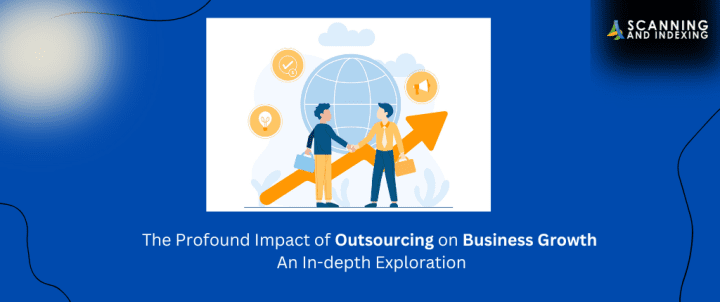The Profound Impact of Outsourcing on Business Growth: An In-depth Exploration
In this dynamic and highly competitive business era, attaining solid growth is a constant quest for companies across industries. To achieve success, businesses must manage the market complexities, enhance their operations and assign resources essentially. Outsourcing is the latest strategy that has proven to be ground-breaking in this endeavor. This process includes assigning specific tasks, functions, or processes to outside partners, enabling businesses to invest in significant competencies and boost growth. So let us get deep into the profound impact of outsourcing on business development. Also, understand the role of outsourcing in generating cost savings, facilitating scalability, enhancing operational efficiency, and fostering focused strategic efforts.

How Outsourcing Helps Business Growth
- Cost Savings
Outsourcing is the most effective way to save costs. Because regardless of the size, businesses tackle the challenges of handling operational expenses while maintaining quality and innovation. Outsourcing act as a robust source in achieving this fine balance. By assigning repetitive and time-consuming tasks other than the core projects to specialized third-party providers, companies can experience a significant decrease in operational costs.
While outsourcing, businesses can reduce labor costs, which is a considerable element in any business budget. As companies can make use of talented professionals devoid of the financial commitment of full-time employees. This prevents the requirement for comprehensive hiring, training, and onboarding processes, which requires time and money.
Outsourcing also eliminates the requirement for maintaining in-house departments for tasks that are not important to the core competencies of businesses. This results in less overhead expenses, including office space, equipment, and utility expenses. Businesses invest this time and money in high-priority tasks that impact the growth of the business, including research and development, market expansion, and customer acquisition strategies.
- Scalability
Business growth cannot be achieved in a single line; it includes expansion phases, barriers, and occasional contractions. To accommodate these fluctuations, scaling operations can be challenging if it not handled efficiently. Outsourcing becomes the strategic tool that lets businesses navigate growth with flexibility and adaptability. By outsourcing tasks like customer support or order fulfillment, the company can quickly enlarge its operational efficiency rather than hiring and training new employees. However, during low demand, businesses can scale back their outsourced services, eliminating unwanted expenses.
In addition, outsourcing reduces the risks related to market fluctuations. Economic downturns and uncertainties can impact a company’s operations and profitability. Through outsourcing, companies can adapt to their outsourcing agreements in response to varying market conditions. This flexibility guarantees that growth is constant and risks are reduced, optimizing complete business resilience.
- Efficiency
Efficiency is significant for every successful business, boosting productivity, cost-effectiveness, and customer satisfaction. Outsourcing leverages the principle of specialization, whereby tasks are allocated to professionals who are experts in their particular vertical. This way of approach results not only in improved performance but also facilitates the accomplishment of growth objectives.
When businesses decide to outsource, they get access to a large pool of talented and experienced professionals who deliver industry-based knowledge and best practices. This leads to simplified processes, mitigates error rates, and ensures on-time delivery of tasks. Moreover, outsourcing enables internal teams to address core competencies and strategic initiatives. As the employees are liberated from the burden of time-consuming and non-core tasks, they can invest their energy and creativity in innovation, product development, and customer engagement. This harmony between the internal and external teams leads to a flawless workflow that enhances efficiency and sustains an environment aimed at growth.
- Focus
On the way to development, businesses often find themselves struggling with a heap of tasks and responsibilities. Lacking proper focus results in the uneven distribution of resources, hindering strategic goal attainment. Outsourcing allows businesses to associate resources with core competencies and high-impact initiatives. In addition, outsourcing enables businesses to adjust to the varying market dynamics quickly. Companies can associate with specialized providers to rapidly implement solutions when dealing with new challenges or opportunities. This flexibility helps businesses seize new trends, enter new markets, and adjust strategies for growth.
Thus outsourcing has become a significant strategy for business growth, providing multiple benefits. It facilitates cost savings by assigning non-priority tasks to external experts, freeing up your resources to spend more time on innovation and market expansion. the flexibility of outsourcing empowers businesses to navigate growth with agility, adapting to changing market conditions and mitigating risks. As businesses continue to change, embracing outsourcing as an inevitable element of their growth strategy can offer a competitive edge that drives them toward sustained success. By tapping into specialized expertise, optimizing costs, and strategically allocating resources, companies position themselves for growth in an ever-changing business landscape. Need to elevate your business to new heights with success and sustainable growth? Then we are here to help you. We at Scanning & Indexing, have proven our expertise in helping businesses over a decade. Connect with us at [email protected] to know more.





